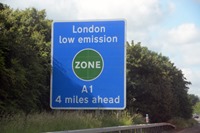
The Mayor of London, Sadiq Khan, has laid out proposals for delivering the Central London Ultra-Low Emission Zone (ULEZ) in 2019, a year ahead of schedule, extending the ULEZ to the North and South Circular in 2019 or later, and started the formal consultation necessary to introduce the ‘T charge’ for older polluting vehicles in October 2017.
The proposals are part of the Mayor’s second air quality consultation led by Transport for London (TfL), following a consultation last summer which attracted 15,000 responses.
The proposed Emissions Surcharge (T-charge) would apply to older polluting vehicles driving into the Congestion Charge zone from October 2017. This charge would be in addition to the Congestion Charge and would apply to vehicles that do not meet the Euro 4 emissions standard for NOx and PM emissions. Pre-Euro 4 vehicles are generally those registered up to and including 2005. The charge, costing £10 per day for non-compliant vehicles, would operate at the same times as the Congestion Charge (Monday to Friday, 07:00 – 18:00).
All vehicles that receive a ‘nine or more seats’ 100% Congestion Charge discount (including minibuses and coaches) and do not meet the Euro 4 standard would need to pay this daily £10 Emissions Surcharge.
Vehicles with a historic tax class (40 years and older) and/or commercial vehicles manufactured prior to 1973, that currently pay the Congestion Charge, would be exempt from the Emissions Surcharge.
Sadiq Khan said: “Toxic air in London is a health emergency that requires bold action, including introducing charges for older polluting vehicles and expanding the ULEZ.
“I am determined to help every Londoner breathe cleaner air. After the massive response to my first consultation I now need the public to let me know their views on my detailed proposals to help clean-up our filthy air.“
Alex Williams, TfL’s Managing Director of Planning, said: “The Mayor has asked us to set out in detail and seek views on a range of proposals that will have a significant impact in reducing pollution in the capital.
“We think these ambitious proposals show London is taking the lead globally in tackling one of the biggest challenges of the 21st century. I would urge as many people as possible to respond to the consultation to help us shape our plans.”
The consultation gives Londoners’ the opportunity to have their say on the preferred date for the start of an expanded Ultra Low Emission Zone – which is up to the North South circular for cars, motorcycles and vans, and in central London for buses, coaches and lorries. Options include as early as 2019 to 2021 or later.
The Mayor has also called on Government to put in place a national diesel scrappage scheme to help people replace vehicles affected by the proposals. There was overwhelming support for this in the first round of his consultation.
To further support the ULEZ, TfL will ensure all double-decker buses operating in the ULEZ will be hybrid and all single decker buses will be fully electric or hydrogen.
The Freight Transport Association (FTA) reacted with disappointment to the revised plans, claiming it would cause serious difficulties for businesses.
FTA’s Head of National and Regional Policy, Christopher Snelling, commented: “We stated before that the central ULEZ starting in 2019 and expanding in 2020 would cause significant issues.
“No-one disputes the need to improve air quality. What we do object to is the one-sided nature of these measures – all burden and no support.
“London could improve air quality more quickly and reduce the burden on businesses at the same time by offering a temporary discount to the Congestion Charge for compliant vehicles prior to the ULEZ starting. The Government has said it has no interest in a scrappage scheme and we see no prospect of that changing.”

